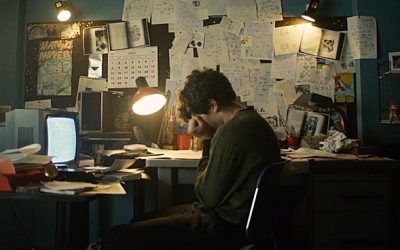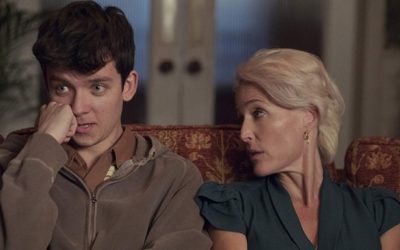
Legend Of Zelda animated short leaves us wanting more
Matthew Byrd
Jan 11, 2019
A new Legend Of Zelda animation shows why we need an animated Zelda series.
There’s a new piece of The Legend Of Zelda: Breath Of The Wild animation out there that has us dreaming of …
Netflix sued over Bandersnatch’s Choose Your Own Adventure usage
The ‘Choose Your Own Adventure’ usage of Black Mirror: Bandersnatch has led to a lawsuit from the book series publisher.
Say what you will about the perceived originality of its concept, Netflix Black Mirror standalone movie Bandersnatch has likely opened the floodgates for future streaming offerings across platforms to similarly utilise a “Choose Your Own Adventure” style interactive narrative. However, it seems that said style description is more potent than Netflix anticipated, since it has led to a lawsuit from the publisher of the popular book series it references.
Chooseco LLC, a Vermont-based book publisher which – indicated by its very name – holds the rights to “Choose Your Own Adventure” branding, is seeking $25 million in damages from Netflix in a lawsuit that claims exploitation of the publisher’s established brand awareness to promote the December release of Black Mirror: Bandersnatch, reports Variety. The young-reader-aimed Choose Your Own Adventure book series – originally published by Bantam Books until the trademark lapsed – enjoyed widespread popularity in the 1980s and 1990s, remembered as childhood-defining school book fair standards, having sold 265 million copies.
That, however, is the rub, since Netflix, from its earliest of teases for Bandersnatch as a nameless hush-hush project, has made liberal use of the “Choose Your Own Adventure” term, even allowing its main character, Fionn Whitehead’s Stefan, to name-drop it in the film itself when explaining his eponymous game pitch to his father. It’s an understandable strategy, since the branding is synonymous with the book genre, even though several book publishers released their own versions during the genre’s heyday, notably the “Endless Quest” book series released under the Dungeons and Dragons branding of TSR.
Yet, Netflix has seemingly stepped on another proverbial nail here. A key grievance in Chooseo’s suit centers on the fact that Netflix attempted to acquire a license to use the Choose Your Own Adventure branding over the course of a few years; negotiations that failed to bear any fruit. Moreover, studio 21st Century Fox – which, not for nothing, is about to be enveloped by the colossal corporate umbrella of Disney – just optioned the movie rights to the branding in early 2018. Indeed, it was hardly a dormant branding, with Choose Your Own Adventure movie plans having been discussed for years at this point.
It will certainly be interesting to see what comes of this legal drama. We will keep you updated as things develop!
Sex Education spoiler-free review
Netflix’s new teen comedy show starring Gillian Anderson, Sex Education is a raunchy yet compassionate look at hormone-crazed adolescence…
It’s a great time to be coming of age. Not since the late ‘90s has there been such an explosion of movies and television shows centred on the discomfort and growing pains of the teenage experience. Hell, with movies like Lady Bird being nominated for Academy Awards and this year’s Eighth Grade in serious contention, coming-of-age teen entertainment has never been taken more seriously as legitimate art.
Netflix in particular has become a hub for these stories. All the Boys I’ve Loved Before, The Chilling Adventures of Sabrina, Sierra Burgess Is a Loser, and Alex Strangelove are entertainment for and about teens, while raunchier fare like American Vandal or the animated, adolescent-focused Big Mouth (our favourite comedy of 2018) ask adults to reminisce on their awkward years. Stories about teenagers appeal to us all because the uncertainty that comes with growing up never truly goes away, even when you’re well into adulthood. Puberty may last a short amount of time, but it’s a universal experience that’s relatable for a lifetime.
Enter Netflix’s newest comedy series Sex Education. Set in the UK, yet singularly inspired by American teen comedies like the John Hughes canon, Sex Education is a bit tamer than Big Mouth in its exploration of hormone-induced teenage horniness and all of the confusing, mortifying things that come with it, but it’s still definitely too wild to be screening in your son or daughter’s high school health class. Centered on Otis (Asa Butterfield), the son of sex therapist and bestselling author Jean Milburn, Sex Education finds Otis and the complicated, secretly brilliant Maeve (Emma Mackey) dealing out sex advice to their clueless classmates despite the fact that Otis’ sex-positive upbringing has left him an asexual mess who is frightened of his own phallus.
Early on in the series, Sex Education goes for crass, gross-out humor too often instead of the sweeter, more sincere character work that it settles into later in the series. The pilot in particular can be a slog to get through, playing up way too many clichés of the genre; do we really need to see another scene in a teen TV show where the best friend character gives a long monologue outside of school on the first day, explaining the series’ mission statement and breaking down the school’s social hierarchy? I thought Not Another Teen Movie put that old trope to bed for good. But as I said, once the show finds its groove, it relies less on sex-based gags and instead explores the emotional issues underlying these teens’ bedroom issues with the sweet compassion that you’d find in this genre’s very best stories.
Otis’ queer best friend Eric, played by Ncuti Gatwa, highlights this change the best. What starts off as a cliched, token best friend role gets deeper as we witness his home life and his slow journey of figuring himself out. The same goes for Aimee (Aimee Lou Wood) a stereotypical airhead popular girl who is allowed to transform into something more nuanced, sweet, and most importantly, funny. Butterfield is great as Otis, all bug-eyed and nervous, noticeably uncomfortable in his own skin, but with enough charm bubbling underneath, and Mackey should see plenty of work coming her way after making Maeve the standout character. Obviously, Den of Geek fans will get a kick out of seeing Anderson have so much fun as the sexually brazen Jean, and she’s able to display some of Scully’s deep sensitivity and warmth once the characters’ quirks are established.
With plenty of classic ‘80s tunes on the soundtrack to set the tone (and some killer original cuts by androgynous punk powerhouse Ezra Furman), Sex Education hits all the expected marks for a loving, British homage to teen comedies, while also hitting on serious, often moving and deeply human new territory. With shows as smart and caring as Sex Education around to help guide the way, coming-of-age has never been so easy.
Sex Education is streaming now on Netflix UK.
Sex Education spoiler-free review
Netflix’s new teen comedy show starring Gillian Anderson, Sex Education is a raunchy yet compassionate look at hormone-crazed adolescence…
It’s a great time to be coming of age. Not since the late ‘90s has there been such an explosion of movies and television shows centred on the discomfort and growing pains of the teenage experience. Hell, with movies like Lady Bird being nominated for Academy Awards and this year’s Eighth Grade in serious contention, coming-of-age teen entertainment has never been taken more seriously as legitimate art.
Netflix in particular has become a hub for these stories. All the Boys I’ve Loved Before, The Chilling Adventures of Sabrina, Sierra Burgess Is a Loser, and Alex Strangelove are entertainment for and about teens, while raunchier fare like American Vandal or the animated, adolescent-focused Big Mouth (our favourite comedy of 2018) ask adults to reminisce on their awkward years. Stories about teenagers appeal to us all because the uncertainty that comes with growing up never truly goes away, even when you’re well into adulthood. Puberty may last a short amount of time, but it’s a universal experience that’s relatable for a lifetime.
Enter Netflix’s newest comedy series Sex Education. Set in the UK, yet singularly inspired by American teen comedies like the John Hughes canon, Sex Education is a bit tamer than Big Mouth in its exploration of hormone-induced teenage horniness and all of the confusing, mortifying things that come with it, but it’s still definitely too wild to be screening in your son or daughter’s high school health class. Centered on Otis (Asa Butterfield), the son of sex therapist and bestselling author Jean Milburn, Sex Education finds Otis and the complicated, secretly brilliant Maeve (Emma Mackey) dealing out sex advice to their clueless classmates despite the fact that Otis’ sex-positive upbringing has left him an asexual mess who is frightened of his own phallus.
Early on in the series, Sex Education goes for crass, gross-out humor too often instead of the sweeter, more sincere character work that it settles into later in the series. The pilot in particular can be a slog to get through, playing up way too many clichés of the genre; do we really need to see another scene in a teen TV show where the best friend character gives a long monologue outside of school on the first day, explaining the series’ mission statement and breaking down the school’s social hierarchy? I thought Not Another Teen Movie put that old trope to bed for good. But as I said, once the show finds its groove, it relies less on sex-based gags and instead explores the emotional issues underlying these teens’ bedroom issues with the sweet compassion that you’d find in this genre’s very best stories.
Otis’ queer best friend Eric, played by Ncuti Gatwa, highlights this change the best. What starts off as a cliched, token best friend role gets deeper as we witness his home life and his slow journey of figuring himself out. The same goes for Aimee (Aimee Lou Wood) a stereotypical airhead popular girl who is allowed to transform into something more nuanced, sweet, and most importantly, funny. Butterfield is great as Otis, all bug-eyed and nervous, noticeably uncomfortable in his own skin, but with enough charm bubbling underneath, and Mackey should see plenty of work coming her way after making Maeve the standout character. Obviously, Den of Geek fans will get a kick out of seeing Anderson have so much fun as the sexually brazen Jean, and she’s able to display some of Scully’s deep sensitivity and warmth once the characters’ quirks are established.
With plenty of classic ‘80s tunes on the soundtrack to set the tone (and some killer original cuts by androgynous punk powerhouse Ezra Furman), Sex Education hits all the expected marks for a loving, British homage to teen comedies, while also hitting on serious, often moving and deeply human new territory. With shows as smart and caring as Sex Education around to help guide the way, coming-of-age has never been so easy.
Sex Education is streaming now on Netflix UK.
Xbox Game Pass: full list of new games for January 2019
Rob Leane
Jan 11, 2019
Ultimate Marvel Vs. Capcom 3 is among the new titles on the Xbox Game Pass this month…
The Xbox Game Pass is Microsoft’s subscription service for Xbox One owners. It’s designed to be li…
The Orville season 2 episode 3 review: Home
The latest episode of The Orville season 2 has somewhat bizarre, clumsy subtext. Spoilers ahead in our review…
This review contains spoilers.
2.3 Home
Hardcore fans of The Orville will often cite the fact that the show holds true to the spirit of Star Trek: The Next Generation, but the reality is that most episodes feel more like a late-season Voyager episode or standalone episodes of Star Trek: Enterprise. And before Orville fans take offence at that statement, this isn’t intended as an insult. I love Enterprise, specifically the 2004 episode titled Home, which shares its title— and themes — with this episode of The Orville. When Alara’s (Halston Sage) physical condition begins to weaken, she has to return to her home planet resulting in a weird storyline about anti-vaxxers in space and a heartbreaking departure.
As far as the set-up goes, hardcore Trekkie, the new Orville episode Home will feel like a mash-up of the Enterprise episode Home, the Deep Space Nine episode Prodigal Daughter and a dash of The Next Generation’s Family. The old Trek formula here is pretty simple: A crew member returns to their home planet for a sci-fi reason, but the episode is really about how that character pissed off their family by leaving said home planet, and through the course of the episode has to learn how to make peace with their family, and get their family to accept their new space-adventure life.
In fairness, this episode of The Orville gives Alara a better — and more exciting — reason for returning home than the Treks it is referencing. In the Enterprise version of Home, T’Pol had to return to Vulcan to participate in a mock wedding. In Deep Space Nine’s Prodigal Daughter, Ezri Dax was back home because of a secret mission. And in TNG’s Family Picard was home on Earth, mostly just because the show needed a break.
But Alara is home because of her alien physiology. The reason why she’s super-strong normally is because her home planet has gravity that is way heavier than ‘standard’ Earth gravity. But, when she loses an arm wrestling match to the equally strong robot Isaac, it’s clear her bones are weakening. Hence, Alara is forced to convalesce on her home planet. This leads to conflicts with her father (Star Trek: Voyager’s Robert Picardo reprising his role from season 1) conflicts her mother (Molly Hagan), and eyerolls from her sister (Candice King). The set-up also allows this episode to literally bring in a reference to Star Trek: Enterprise in the form of John Billingsley as a neighbor named Cambis who walks over and introduces a new plot point. Billingsley played Dr. Phlox on Enterprise, which is meta, because of course, Picardo played the holographic Doctor on Voyager. Which means, when Billingsley and Picardo sit down for a meal together, this is actually two Star Trek doctors hanging out.
But, that’s not the reason Billingsley’s Cambis is there. Turns out, his house was supposedly been broken into and the local cops haven’t done anything about it. Alara is, of course, the security chief on The Orville, meaning she immediately goes into detective mode. This is a little like in TNG’s Family when Picard is presented with an opportunity to do cool work on Earth, that would mirror fun exploratory work he does in space. The stakes for Alara are different, of course, but the set-up is similar.
However, the episode takes a truly bizarre turn when it turns out that Cambis and his wife (Kerry O’Malley) are really there to take revenge on Alara’s dad, because he once authored a paper which shut-down their son’s research that certain vaccine put children at risk. Basically Alara’s dad is pro-vaccination, and this couple is against it, mostly because the refutation of their son’s anti-vaxx research led to his suicide.
This plot point is not only bizarre, but clumsy. Not only does it distract from the story of Alara trying to get her mojo back, but it also sends a strange message. Are we meant to sympathise with the guy who killed himself for with his anti-vaxx research? Or, because the parents are resorting to terrorising people and pointing guns, is The Orville trying to say that anti-vaxxers will try to hold people at gunpoint? Many episodes of Star Trek have awkward mixed messages like this (TNG’s The Outcast springs to mind) but the bizzare thing about this episode of The Orville is that the anti-vaxx thing comes out of nowhere, late in the third act of the episode. Sure, it all gets resolved with the help of Ed and the gang, but it makes an otherwise heartwarming episode feel gross.
It’s also particularly heartbreaking because the episode ends with Alara leaving the crew of The Orville seemingly forever. For Trek fans, this is like some Tasha Yar action, but worse, because Alara’s departure seems totally unnecessary. In the real world, rumors suggest that Halston Sage might return to the show, but in the immediate future, she will be replaced by another Xelayan character named Talla, played by Jessica Szohr. Will Talla and Alara interact? Will Alara return? As of this writing, it’s unclear what is going on exactly. But if this is Alara’s last episode of The Orville, it could have been a lot better.
Read Ryan’s review of the previous episode, Primal Urges, here.
PlayStation Now: full list of new games for January 2019
Rob Leane
Jan 11, 2019
Prey and Metro 2033 are among the new games on PlayStation Now this month…
PlayStation Now is Sony’s cloud gaming subscription service, which is designed for fans of the PlayStation fam…
The Punisher season 2 spoiler-free review
Tyler McCarthy
Jan 14, 2019
The Punisher season 2 is a big improvement over the first season, says Den Of Geek US. Hopefully Marvel and Netflix keep it going…
After seeing the titular hero brutally avenge the…
The Punisher season 2 spoiler-free review
Tyler McCarthy
Jan 14, 2019
The Punisher season 2 is a big improvement over the first season, says Den Of Geek US. Hopefully Marvel and Netflix keep it going…
After seeing the titular hero brutally avenge the…
The Punisher season 2 spoiler-free review
Tyler McCarthy
Jan 14, 2019
The Punisher season 2 is a big improvement over the first season, says Den Of Geek US. Hopefully Marvel and Netflix keep it going…
After seeing the titular hero brutally avenge the…







